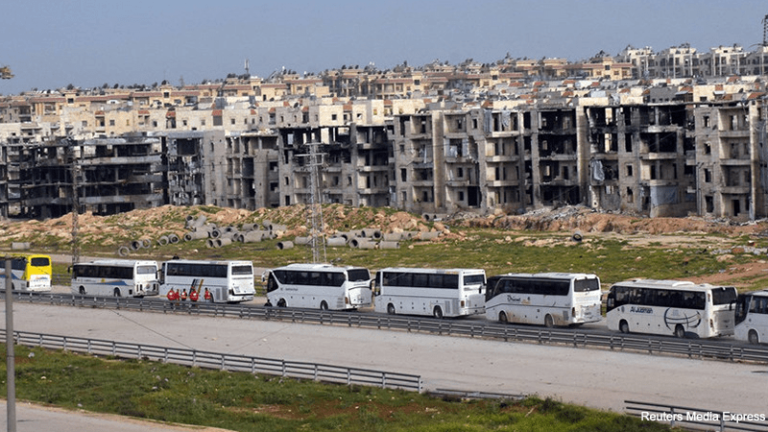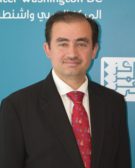
The situation in Syria continues to defy an observer’s understanding of reality. Indeed, no Syrian in 2011 imagined that the regime of Bashar al-Asad would use fighter jets like Qadhafi did in early 2011 to kill his own people; instead, Syrian society expected the international community not to allow a similar scenario to unfold in their country. They witnessed NATO’s intervention in Libya after the threat of the use of air power against civilians in Benghazi. in Syria, starting in 2013 and afterward, the Asad regime’s barrel bombs started raining down on the population and became the most systematic and widespread weapon the government used against civilians. By July 2015, as areas in Syria were no longer under government control, more than 120,000 people lost their lives due to barrel bombs. The response of the international community was to ignore this grave violation of International Humanitarian Law.
Similarly, one recalls the opposition’s early debates in workshops and conferences about the use of chemical weapons, with a consensus in 2012 that the Asad government could not cross the red line drawn by President Barack Obama—and, simply, that there would be no need for the government to use a gas like Sarin as long as it continued to be successful in killing its people by conventional weapons. In fact, the Asad government used Sarin gas in August 2013, killing more than 1,000 people and bringing the total number of casualties from chemical attacks in Syria to 1,500 as of March 2016. Again, the Syrian government stated that it had given up its arsenal of chemical weapons after the deal between the United States, under the Obama Administration, and Russia in 2013. Nevertheless, the government brazenly used Sarin gas again in April 2017, leaving at least 83 dead in Khan Sheikhoun in Idlib province. The Syrian American Medical Society has documented 109 chlorine gas attacks in Syria since the civil war began in 2011.
The New Reality in Syria Today
Many continue to deny the fact that Syria is effectively facing a partition of sorts as a result of what the government calls “local reconciliation,” a policy the opposition perceives as “ethnic cleansing.” Such demographic changes mean major forced displacements of the majority of the Sunni population; Shia Iraqis and Iranians who replace these Syrians in their towns and villages also receive citizenship.
The events of the last week increase this fear among the Syrian population in general and the political opposition forces in particular. The population deal, which entails a swap between civilians and militants in the towns of Foua and Kefraya—which are both Shia and have been under siege by the armed Syrian opposition, namely Ahrar al-Sham—with civilians and fighters from Zabadani and Madaya, both of which are Sunni towns and have been under Syrian government siege with no access to food or water for almost three years. The international media disseminated pictures of babies who had died of hunger in Madaya, which went viral on social media.
The population swap deal comes after five different and earlier deals that included Sunni cities that participated in anti-government protests in 2011. Their populations then joined the armed opposition to defend their towns and prevent Syrian government troops from invading or entering them and massacring the civilians. The international organizations reported that these massacres or displacement deals had been perpetrated based on sectarian lines.
The first city that was subject to such an enforced displacement deal was Homs. The neighborhoods of the old city, which are predominantly Sunni, were subjected to massive shelling and near-total destruction, forcing most of their people to flee. After a two-year siege, the regime structured a deal with the Free Syrian Army (FSA) to flush out the 2,250 fighters, as well as the civilians who were trapped with them, to the northern countryside. This agreement led to emptying the old town completely from its native inhabitants and to attract more loyalists to the government. The population of Homs dropped from 1.5 million in 2011 to nearly 400,000 people today, with 65 percent of the city’s indigenous population leaving to Idlib province.
The Darayya massacre of August 2012, where more than 700 civilians were slaughtered, led to increased recruitment for the FSA in the town. The FSA took full control of the city in 2014. Due to its closeness to the capital, Damascus, the Asad government encircled Darayya and put it under a brutal siege with no access to food or water. The civilians remaining in the town came to depend completely on the underground tunnel network for almost four years; they endured heavy bombardment, including barrel bombs, nearly every day. The United Nations’ Under-Secretary-General for Humanitarian Affairs and Emergency Relief Coordinator, Stephen O’Brien, actually called Darayya “Syria’s capital of barrel bombs.” Eventually the civilians and militants decided to give up after threats from the government in 2016 that it would burn what was left of the city; the civilians fled to Idlib, which became the capital of the opposition.
Darayya, a city whose population was 250,000 before 2011, became empty. For almost four years its inhabitants were deprived of medical and food aid. The only UN convoy allowed by the government to enter the city since 2012 was on June 10, 2016, when a delegation of UN officials along with essential assistance distributed contraceptive pills and mosquito-resistant tents, which they said was what the government allowed. The government then bombarded the town with tens of barrel bombs and the United Nations did not try to bring aid to Darayya again. After the completion of the forced displacement of the city’s inhabitants, President Asad made a rare trip to the empty city in September 2016 and performed the Eid al-Adha prayer in a mosque there. He responded (AR) to a journalist’s question about the demographic changes in Syria by saying that a city’s demography “changes across generations” and pointing out that this is based on the interests of citizens in those areas. He added, “As for Syria, as in any country, the demographic situation is changing because of the economic benefit of the people, the social status and the political conditions vary. Of course, I do not talk about the countryside. The villages are different, but the cities are always diverse, being close to major cities like Damascus and Aleppo are diverse cities that can’t be of one color and one form.”
In examining these events, it is clear that Asad refused to mention one critical component of his strategy: that all civilians in Darayya were evacuated into Idlib against their will. Those who decided not to leave were then under the regime’s mercy and were detained or tortured; others were bussed into rebel areas of northern Syria in a forced population transfer. During the negotiations, the government secured concessions by threatening to kill all civilians unless rebels left the town. This is a clear violation of the IHL and can be seen as a sign of ethnic cleansing and demographic change that has resulted from the Syrian conflict.
Article 129 of the Customary IHL states clearly that, “Parties to a non-international armed conflict may not order the displacement of the civilian population, in whole or in part, for reasons related to the conflict, unless the security of the civilians involved or imperative military reasons so demand.” Further, the Statute of the International Criminal Court states that in non-international armed conflicts, “ordering the displacement of the civilian population for reasons related to the conflict, unless the security of the civilians involved or imperative military reasons so demand” constitutes a war crime.
Unfortunately, the events in Homs and then in Darayya in December 2016, which were repeated in Aleppo in early 2017, were carried out by US-backed moderate local rebels, like those in Darayya. There, too, Russia launched blistering air raids at the start of the Geneva talks in January 2017 to help the regime place 300,000 people under siege. Syrian regime forces, along with Iraqi and Iranian militias backed by Russian air support, used the same tactics that were well documented by the Atlantic Council’s investigative experts, such as barrel bombs and other heavy missiles that targeted all hospitals and medical centers, and chlorine gas, which sent a clear message to civilians and militants that they have no other option but to leave their homes and neighborhoods. This strategy worked very well in Aleppo with the support of Turkey and Russia, which brokered the deal then launched the Astana talks to give it a political cover.
The same pattern was repeated in the deals forged for Zabadani and Madaya. Both cities had been under siege for almost three years. In 2016, the Iranian militias, which are very active in Syria under different names, demanded the exchange of the Shia population in Foua and Kefraya with the population of Zabadani and Madaya. At that time, the deal was rejected by all Syrian opposition groups; the government, along with the Hezbollah militia which has a strong presence there, tightened the siege and made it almost impossible to live there under any conditions. In light of what happened in Darayya and Aleppo, when neither the United Nations nor the international community provided any help, the opposition decided (AR) to go ahead with the deal, understanding its huge implications—that such an agreement could serve to legitimize the “systematic displacement” carried out by the Asad regime and Hezbollah.
US Policy and Syria
After the bus explosion that led to the killing of more than 80 civilians and opposition militants earlier this month, Mark Toner, the acting spokesperson for the US State Department, said briefly, “We deplore any act that sustains and empowers extremists on all sides including today’s attacks, as well as forced migration, increased displacement, and all forms of violence directed against civilians in Syria.” This reflects the fact that the Trump Administration is still in the pre-chemical attack mode. It is possible that the US strike on the Shayrat military airbase the week before the bus explosion will push the US government to develop a strategy for Syria.
The US strike after the chemical attack in Khan Sheikhoun was a valuable opportunity for Washington to take a leadership role in Syria, after many years of leading from behind under the Obama Administration. The strike was supported by most European and Arab leaders, who saw a possibility for the United States to become more involved in Syria and invest more capital in ending the bloody civil war there. Indeed, preventing forced demographic changes and the ethnic cleansing taking place in Syria today requires US leadership and a strong position regarding Russia. Otherwise, the world will sadly continue to witness Syria’s societal breakdown and political demise.

